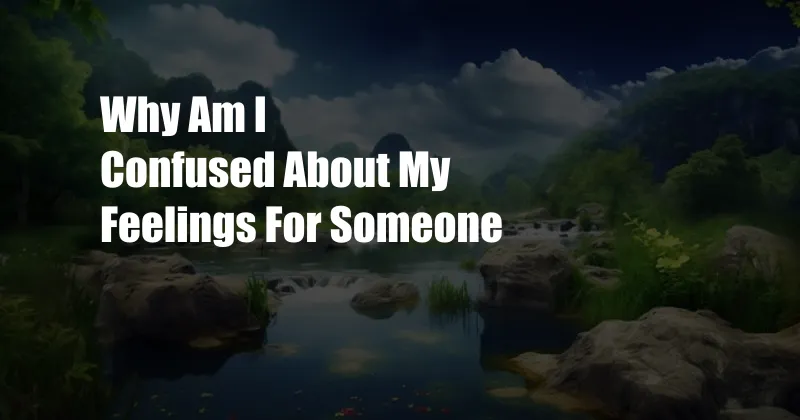
Why am I Confused About My Feelings for Someone?
Have you ever found yourself in a situation where you couldn’t decipher your emotions towards someone? It’s a perplexing feeling, where you oscillate between attraction and indifference, leaving you in a state of confusion. If you’ve been struggling to come to terms with your feelings, this article will delve into the complexities of this emotional turmoil.
Understanding the Nature of Feelings
Feelings are intricate and can stem from various sources, including past experiences, societal influences, and personal values. When it comes to our feelings for someone, they can be influenced by external factors like physical appearance and personality traits. However, our deepest feelings often emerge from a subconscious level, making them challenging to articulate and understand.
The Confusion: Unraveling the Reasons
When confusion about our feelings arises, several reasons may be at play:
- Lack of Self-Awareness: Sometimes, we may not have a solid understanding of our own emotions. This can make it difficult to recognize and interpret our feelings towards others.
- Fear of Commitment: Fear can lead us to question our feelings, especially if we’re not ready for a serious relationship. We may worry about getting hurt or not being good enough, creating doubt and confusion.
- Mixed Signals: If the other person’s behavior sends conflicting signals, it can leave us perplexed. Mixed signals can arise from gestures of affection one moment and walls of indifference the next, confusing our interpretation of their feelings.
- Unresolved Past Issues: Past experiences, particularly negative ones, can cloud our current relationships. Unresolved issues may trigger feelings of insecurity or skepticism, making it hard to trust and understand our present feelings.
- Expectations and Ideals: Societal expectations and our own ideals can shape how we think we should feel towards someone. Comparing our feelings to these expectations can create pressure and confusion.
Navigating the Confusion: Tips and Expert Advice
To navigate the confusion surrounding your feelings, here are some tips and expert advice:
- Practice Self-Reflection: Spend time reflecting on your emotions, journaling your thoughts and feelings. Identify your triggers and patterns, and try to understand the underlying reasons for your confusion.
- Focus on the Present: Dwelling on the past or worrying about the future can intensify confusion. Instead, focus on your present feelings and observations of the person you’re interested in.
- Seek Outside Perspectives: Talk to trusted friends, family members, or a therapist about your feelings. Their insights can offer valuable perspectives and help you gain clarity.
- Take Time and Don’t Rush: Allow yourself ample time to process your feelings and make decisions. Don’t feel pressured to label your emotions or rush into a commitment you’re not ready for.
- Trust Your Intuition: Your gut feeling often tells you what you need to know. Pay attention to your inner voice and follow your instincts, even if your mind is struggling to make sense of your emotions.
Frequently Asked Questions
Q: Is it normal to be confused about my feelings for someone?
A: Absolutely. Confusion in relationships is common and can arise from various factors.
Q: How can I tell if I’m actually confused or just avoiding commitment?
A: If your confusion stems from a genuine inability to understand your emotions, it’s important to address it. However, if your confusion is accompanied by excuses or a lack of desire to commit, it’s crucial to examine your fears and motivations.
Q: Should I stay in a relationship if I’m confused about my feelings?
A: It may be beneficial to take a break from the relationship to give yourself space and time to clarify your emotions.
Conclusion
Understanding and acknowledging confusion in our feelings is a crucial step towards emotional maturity. By embracing self-reflection, seeking support, and trusting our instincts, we can unravel the complexities of our feelings and make informed decisions about our relationships.
Are you interested in exploring this topic further? Leave a comment below and share your thoughts and experiences.